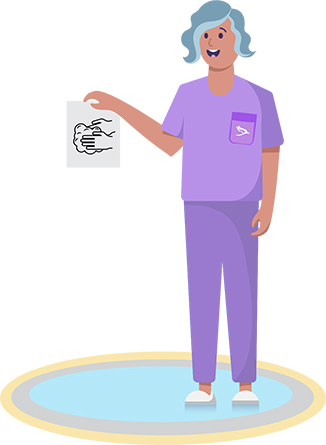How can we help our loved ones with dementia understand about infection prevention? As the COVID-19 pandemic surges on, you are probably worried about keeping your family safe. If you’re caring for someone who has dementia, explaining the importance of hand hygiene and other prevention protocols can be a challenge.
Dementia is not just memory loss; it also affects the brain’s ability to receive and process information. We know at least two parts of the brain are dying. Cells are deteriorating, brain tissue is lost, and the overall size of the brain shrinks.
The language center that is located in the left side of the brain, tends to deteriorate first. This means loss of vocabulary and speech ability and slowing comprehension capacity. Approximately one of every four words that you speak to a person living with dementia will not register in their brain. So, it’s hard for them to comprehend what you are saying, especially if you speak too fast or use complex sentences.
So how can we use this information to better care for people living with dementia during the pandemic? What is the best way to communicate to them the importance of hand hygiene, mask wearing, and physical distancing? Ever-changing rules are confusing to them, scary, and frustrating.
When language is a challenge, care providers can use visual cues to help demonstrate what you are trying to accomplish. For example, my patient doesn’t understand when I say, “let’s go wash your hands, so that we can eat dinner.” Instead, I can use a combination of hand gestures and simple phrases to get my request across. Say, “Sue, look,” while rubbing your hands together at the sink. “Your turn, Sue.”
Keep it simple. There’s no need to explain in so many words that “we’re in a pandemic and we need to wash our hands all the time to prevent sickness.” (By the way, paranoia is another common development in people living with dementia. Using terms like pandemic or worldwide virus outbreak can unnecessarily incite panic, fear, and worrying.”)
Note how the first statement has compound concepts “wash hands” and “eat dinner.” Deal with the steps one at a time so as not to overload the person’s brain with instruction.
 Pictures or posters that simply demonstrate the hand-washing process may help the message click. Try a combination of a basic request phrase with your hand gestures, then point to the picture.
Pictures or posters that simply demonstrate the hand-washing process may help the message click. Try a combination of a basic request phrase with your hand gestures, then point to the picture.
In dementia care, it’s important not to treat our patients/loved ones like children. Yet when someone is exhibiting diminishing comprehension skills, it’s easy to slip up and speak to them in a demeaning way, even unintentionally. Check in daily with yourself to be sure you are doing everything you can to preserve the patient’s dignity. Practice patience and compassion.
Additional Resources
Watch this recorded webinar about Dementia Care in the COVID era, presented by dementia specialists from Hope Hospice.
You might also like: